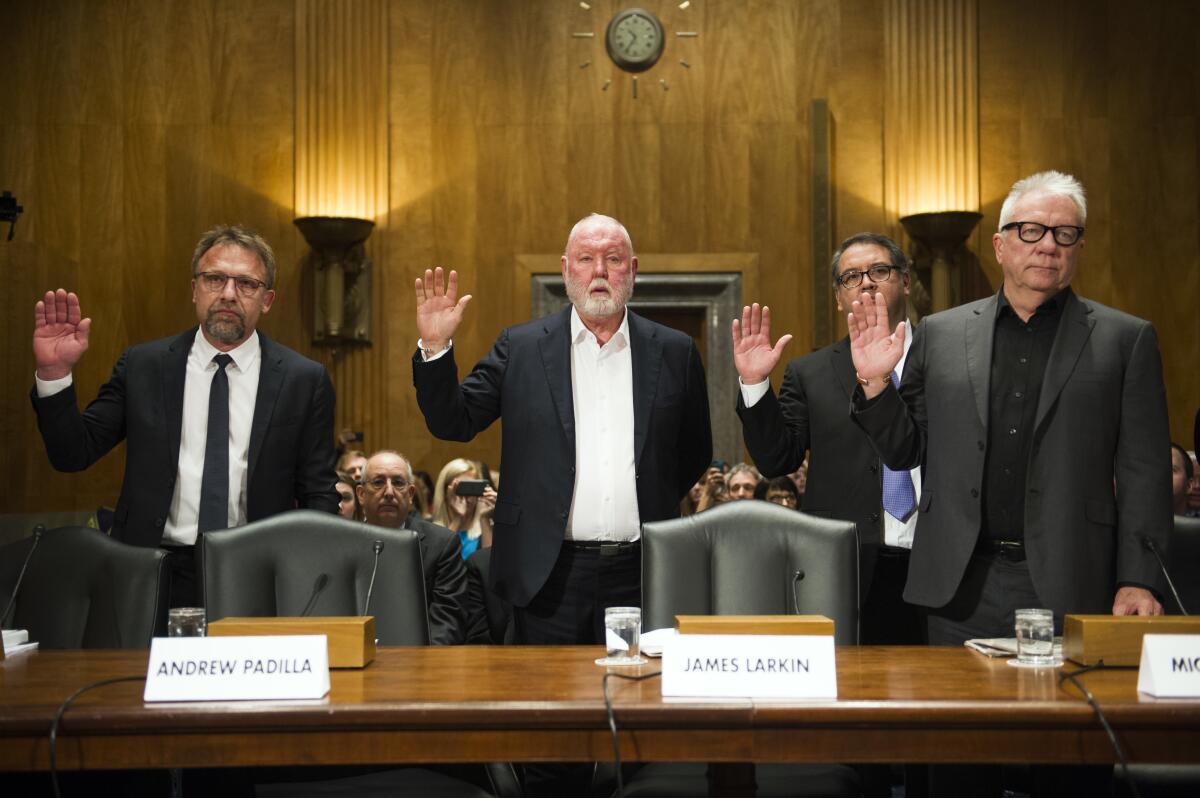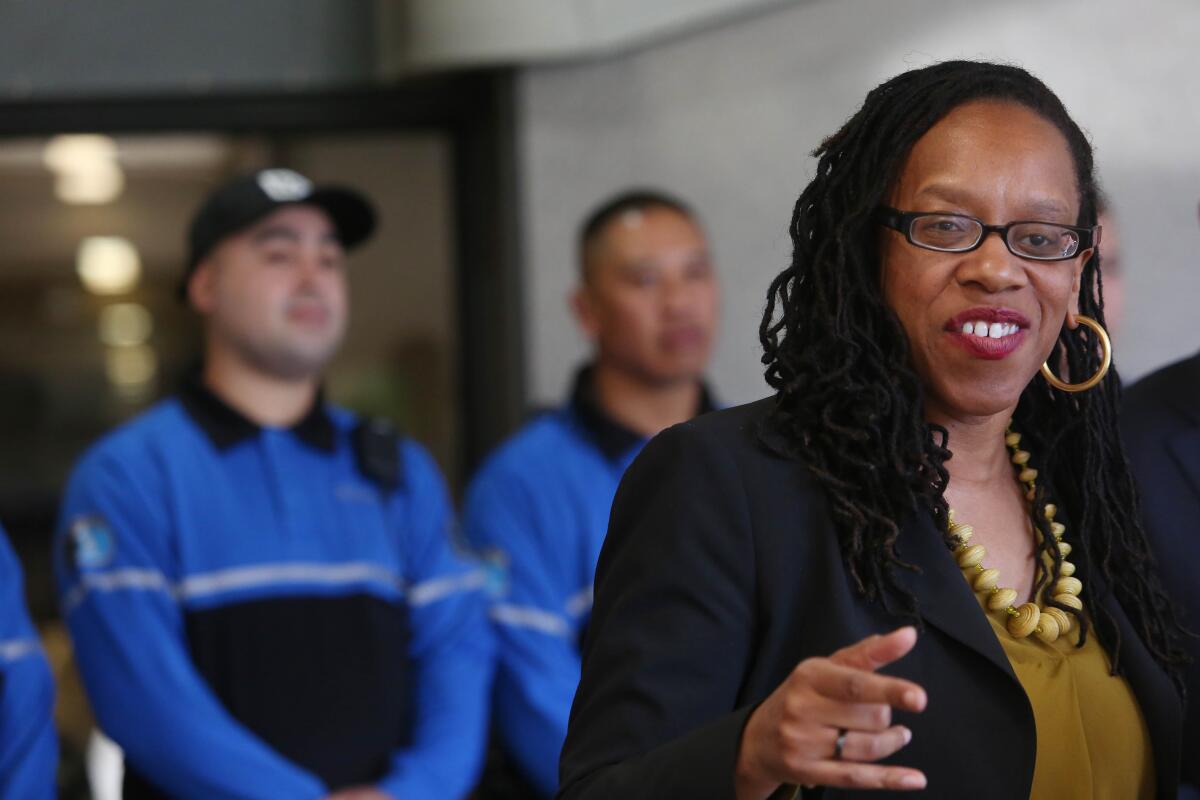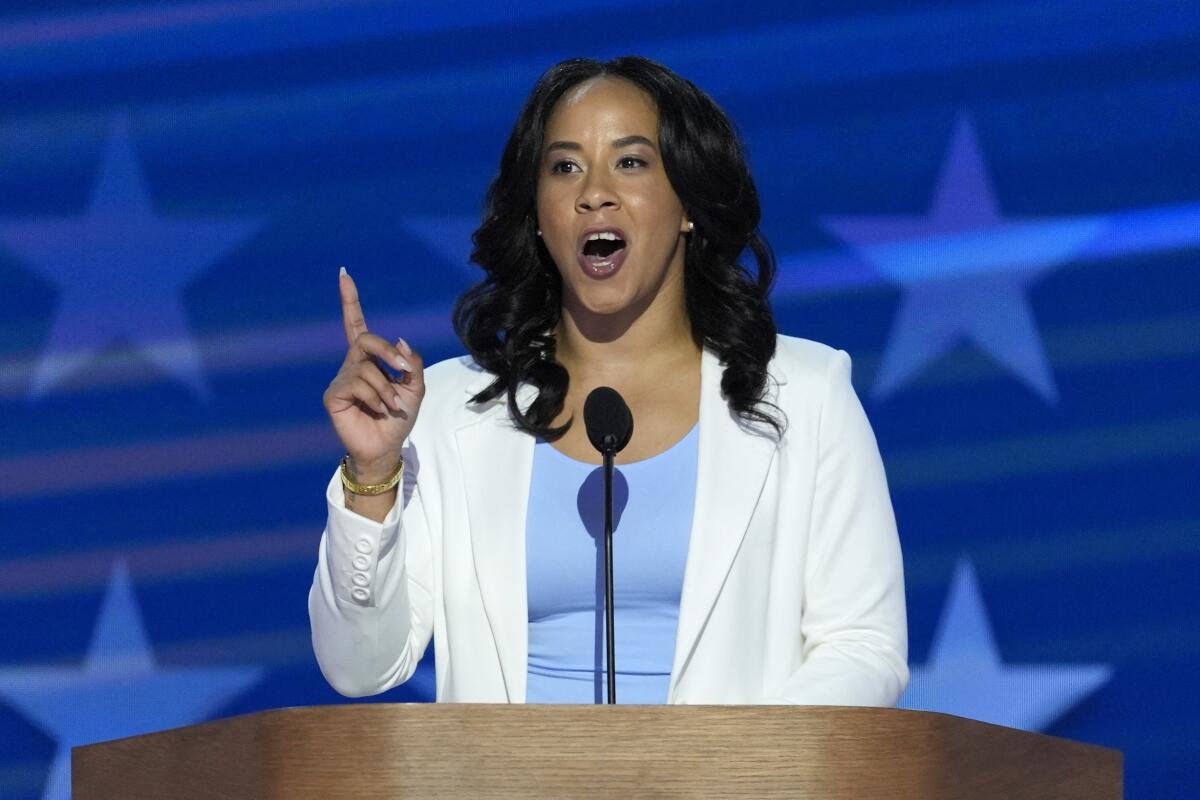Kamala Harris’ revolutionary push to treat sex-trafficked children as victims, not criminals

- Share via
- Harris was an early leader in the push to transform how the justice system handles children who are trafficked, championing policies that treat them as victims instead of criminals.
SACRAMENTO — Twenty years ago, freshly elected as San Francisco’s district attorney, Kamala Harris urged California lawmakers to crack down on child sex trafficking and warned that her fellow prosecutors had gotten it all wrong.
Minors should not be arrested as “child prostitutes” and charged for their own abuse, she said, but deserved to be treated as victims who needed support.
In one of her first acts as an elected official, Harris sponsored a bill signed into law by Republican Gov. Arnold Schwarzenegger that increased penalties for adults who solicited sex from minors and was considered revolutionary for its push to transform children from criminals into victims.
It would turn out to be an often-overlooked but significant moment in the political career of the now Democratic presidential nominee, a rare instance of Harris taking an early stand on an issue that many others — both Democrats and Republicans — would later follow.
The governor’s stance is unknown on a measure that would add prison time for some convicted of sexual crimes against underage youths.
Lawmakers cried hearing testimony in the California Capitol from teenagers sold for sex and imprisoned for it.
“It’s a sea change in terms of how this issue has been dealt with through the ages,” a celebratory Harris said in 2004 after the state Legislature approved the bill. “It’s finally in black and white, legislated, that adults cannot buy children for sex.”
A year later, Schwarzenegger signed another bill she sponsored that made human trafficking a felony and also made it easier for victims to get restitution.
Arresting minors for prostitution in California would not officially be prohibited until Gov. Jerry Brown signed a law in 2016. How the state handles child sex trafficking is still a controversial debate being legislated in Sacramento — though now more commonly spearheaded by Republicans.
But advocates across the political spectrum in California credit Harris for helping create that “sea change” she predicted decades ago and for bringing a once under-the-radar crime to the bipartisan mainstream.
“Everybody’s on the bandwagon to show what they’re doing about human trafficking now, but she was there when it started,” said Maggy Krell, a former state prosecutor who worked with Harris to take down Backpage.com, a classifieds website that allegedly facilitated sex trafficking.
“She really was an architect for that legal framework to hold perpetrators accountable and see victims as victims... which, frankly, just didn’t exist before.”
In many other ways, Harris had been a cautious politician during her time in California, refusing to support a police accountability measure and declining to take a position on some criminal justice reforms.
As she runs for president, Harris has emphasized her credentials as California’s former top law enforcement official. But her campaign declined to answer how she will vote on Proposition 36, a tough-on-crime ballot measure that has divided California Democrats.
Though she broke barriers as the first woman and first Black person elected as San Francisco district attorney and California attorney general, she did not emphasize her race and gender. Harris’ focus on sex trafficking, whose victims are primarily girls and women of color, was one of few instances where her identity was reflected in her public policy priorities.
In 2016 as California attorney general, Harris was the first in the nation to criminally charge operators of Backpage, which raked in millions by offering “adult services.” She called the website an “online brothel” and sought pimping charges for its leaders, alleging that some victims were children. Republican Texas Atty. Gen. Ken Paxton quickly followed suit.
The complex case fizzled amid legal disputes over internet and free speech protections but the government pulled Backpage from the internet in 2018. New charges were filed, and just last month, founder Michael Lacey was sentenced to five years in prison and fined $3 million for money laundering.

Long before Backpage, though, Harris aggressively lobbied law enforcement to reframe sex work involving minors — a big swing to disrupt the status quo that required admitting that her peers had failed.
She made child sex work a focus as she oversaw child abuse cases in San Francisco City Hall and opened a shelter for former child prostitutes in 2005. She helped lead an anti-human trafficking task force in 2007 as San Francisco district attorney and later did the same as attorney general. She supported legislation that ensured traffickers could not keep money reaped from their crimes and pushed for training for first responders to recognize if someone was being trafficked.
While working in City Hall, she refused to use the term “child prostitute” — a refrain that officials like Los Angeles County Sheriff Jim McDonnell would push more than a decade later.
“When it is a girl, a young girl under the age of 18, who is being trafficked, the law should not require that we prove that she was forced,” Harris said at the Commonwealth Club in San Francisco in 2010. “The fact of her age and her youth should be enough.”
Nationally, concerns about human trafficking were starting to catch on, with Republican President George W. Bush assembling the first national training conference on the issue in 2004 and warning that women and children were being forced into “a new form of slavery.”
But in California, Harris’ stance was so rare that Lateefah Simon remembers shuddering when she got a call from her in the early 2000s when she was working for the San Francisco city attorney, scared that it meant someone was in trouble.
Simon was working for the Young Women’s Freedom Center, helping girls who were being trafficked get off San Francisco’s streets. Under the leadership of then-Dist. Atty. Terence Hallinan, cops were arresting minors for prostitution and sending them to juvenile detention centers instead of helping them, Simon said.
But to her surprise, Harris, who would replace Hallinan in 2004, was on their side.
“Lateefah, they’re being raped,” Simon recalled Harris saying on that initial call. “My eyebrows rose a bit and I was like, she gets it.”

Simon agreed to meet with Harris and brought with her sex trafficking victims, including a 14-year-old girl who was pregnant. Harris leaned down, Simon said, cupped the girl’s face in her hands and kissed her on the forehead:
“I remember getting chills at that moment, like, she sees her.”
Harris’ work on sex trafficking was a rare instance in which she took a position ahead of the curve and stuck with it in a long career where she has been criticized by Democrats and Republicans alike for dodging or flip-flopping on issues such as marijuana and fracking in order to win favor in the ever-changing political zeitgeist.
“Mostly every step of the way she was playing it safe,” said Rob Stutzman, a Republican strategist who worked for Schwarzenegger when he was governor. “She bounded around with so many positions and backtracked and so desperately contorted ... . She is more consistent now than she was then.”
A cluster of interviews from 2020 provides a unique window into Vice President Kamala Harris’ nuanced worldview on policing and public safety.
Her advocacy also proved to be a smart political strategy, allowing her record to appear more moderate as she got tough on a crime that her progressive peers calling for less incarceration could not argue with: child abuse.
Fifteen years after Harris supported the California legislation to help trafficked children, her political foe Donald Trump issued a similar executive order as president, declaring human trafficking a priority for the federal government and echoing her concerns about “modern slavery.”
Harris’ balance of compassion for victims and ire for perpetrators — and her background as a prosecutor — was crucial in helping forge bipartisan approval on a politically tricky issue at a time when Democrats were resistant to stiffening criminal penalties and under pressure to address overcrowded prisons, said Kathleen Kim, a professor at Loyola Law School and a national expert on human trafficking.
“It’s undeniable that her support helped the bill become law. Her support was essential,” said Kim, who worked on AB 22, the bill signed by Schwarzenegger in 2005 that she called “an incredibly progressive civil rights law” despite its increase of criminal penalties.
Courtney Baldwin doesn’t know Harris personally but spoke at the Democratic National Convention in Chicago last month in support of her because of her work to combat sex trafficking.

Baldwin, 31, was sold for sex across California when she was a teenager after spending time in the foster system and finding herself abruptly homeless at 17. In an act of desperation to survive, she turned to sex work at the recommendation of a friend.
But a pimp — who made money off of people like Baldwin using Backpage.com — eventually controlled her every move, she said, “tormenting” her and insisting on sex work quotas.
“I didn’t have anything so I just relied on this new lifestyle. But it turned into: I had to do these things or else. I couldn’t sleep until I went out. I couldn’t eat until I did this,” Baldwin said. “Everything became controlled. It felt like, damn, I’m never, ever going to get free.”
She did eventually get free, and is now a youth advocate in Florida. When she took the stage at the DNC last month, Baldwin gave a short speech about Harris’ work to fight sex trafficking. Raising her hands as she addressed the massive convention hall, Baldwin said Harris has “protected people like me her whole life.”
California politics editor Laurel Rosenhall contributed to this report.
More to Read
Sign up for Essential California
The most important California stories and recommendations in your inbox every morning.
You may occasionally receive promotional content from the Los Angeles Times.













